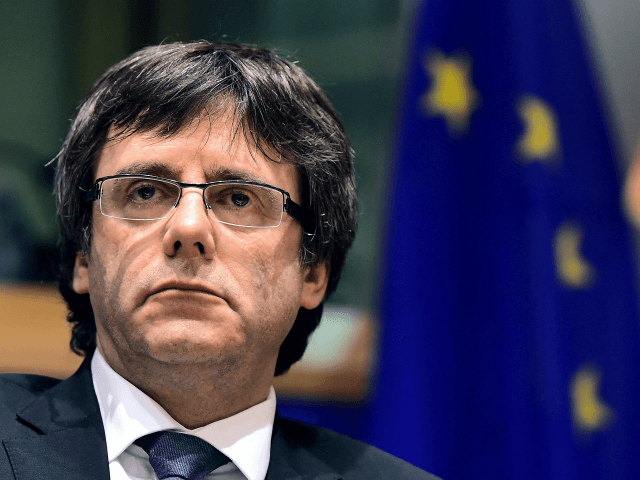MADRID (AP) — A Spanish judge is deliberating Friday on whether to issue an international arrest warrant for Catalonia’s ousted leader a day after she jailed nine former members of the region’s separatist government.
Catalan ex-president Carles Puigdemont flew to Brussels this week after Spanish authorities removed him and his 13-member Cabinet from office for pushing ahead with secession despite repeated warnings that it was illegal.
If an arrest warrant is issued, Puigdemont will fight extradition without seeking political asylum, according to his Belgian lawyer.
Meanwhile, a panel of National Court judges rejected an appeal to release two separatist activists who were jailed last month in a separate sedition investigation.
A National Court spokesman said that Assemblea Nacional Catalana president Jordi Sanchez and Omnium Cultural leader Jordi Cuixart will remain in a Madrid jail while the investigation continues. The spokesman spoke on condition of anonymity in line with court policy.
Assemblea Nacional Catalana and Omnium Cultural have spearheaded the civil society efforts to achieve secession for the northeastern region, boosting separatist ranks to around half of the population of 7.5 million. Sanchez and Cuixart are being investigated for allegedly orchestrating protests that hindered a judicial investigation to halt preparations for a banned independence referendum held on Oct. 1.
Spain’s central authorities have been directly ruling the region since the regional parliament passed a declaration of independence on Oct. 27. The regional government was removed from power and an early election was called for Dec. 21.
Spanish government spokesman Inigo Mendez de Vigo deflected questions by the media regarding the jailing of the Catalan officials, saying that the separation of powers meant that the government’s focus was on preparing the early regional election it called for Catalonia to try to redirect the political crisis.
“There is a separation of powers in Spain and what happened yesterday is in the realm of the justice system and beyond the reach of the government,” Mendez de Vigo said. “What the government guarantees is that there will be elections where the parties which want to run can present their programs, and we hope that the election can end this period of uncertainty and the deterioration of harmonious coexistence in Catalonia.”
Investigative magistrate Carmen Lamela jailed eight of nine Catalan ex-officials who appeared for questioning, including former regional vice president Oriol Junqueras, without bail.
The ninth, ex-regional minister for business Santi Vila, posted bail of 50,000 euros (about $58,000) on Friday after spending a night in a prison and the judge ordered his release from custody. His passport was confiscated and Vila needs to show up in court regularly as the rebellion, sedition and embezzlement probe continues.
“I ask for all political parties across to Spain, appealing to their democratic values, to put an end this terrible situation that has put politicians in prison,” Vila said as he left the Estremera prison near Madrid.
Vila resigned in protest a day before Catalonia’s parliament voted in favor of a declaration of independence and has said he wants to lead the center-right separatist Democratic Party of Catalonia in the upcoming election on a moderate platform.
Prosecutors on Thursday also requested an international warrant seeking Puigdemont’s arrest. Under Spain’s legal system, investigating judges can have suspects detained while a comprehensive probe, sometimes taking months, determines if they should be charged.
The jailing of the former Catalan government officials set off a new round of protests back in northeastern Catalonia. Several thousand people gathered on Thursday night in the main city of Barcelona and other towns to call for their release.
Puigdemont and his Cabinet were removed by Spanish Prime Minister Mariano Rajoy last week a day after the Catalan parliament voted in favor of a declaration of independence. Rajoy used extraordinary powers given to him by the Senate to depose the separatists, dissolve the regional legislature and call the early regional election.
Puigdemont surfaced in Belgium on Tuesday with some of his ex-ministers, saying they were seeking “freedom and safety” there. He and four of the officials remained in Brussels on Thursday.
Spain’s Supreme Court is also investigating six members of Catalonia’s parliament. The court postponed a hearing Thursday until next week to allow more time for them to prepare their defenses in the case.
In all, Spanish prosecutors are investigating 20 regional politicians for rebellion and other crimes that would be punishable by up to 30 years in prison.
The Catalan secession push is the worst institutional crisis to hit Spain in nearly four decades.
Spain’s central bank said on Thursday that a protracted political conflict could damage Spain’s, and especially Catalonia’s, economy. More than 1,000 companies have already relocated their headquarters from Catalonia to other parts of Spain because of the uncertainty.
Spain’s Ministry of Employment and Social Security said Friday that Catalonia led Spain’s 17 autonomous communities in job loss in October with nearly 15,000 more people out of work.
Enric Millo, the representative of Spain’s central government in Catalonia, said the destruction of jobs was due to concern among businesses and investors regarding the separatist movement.

COMMENTS
Please let us know if you're having issues with commenting.